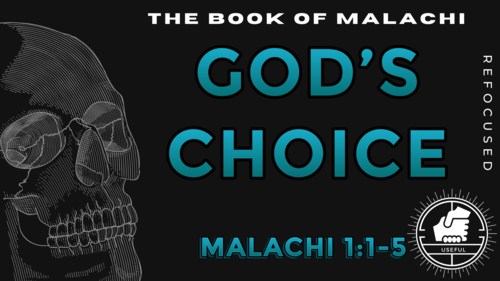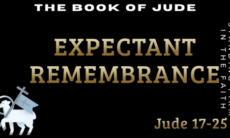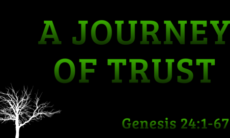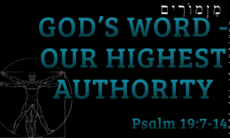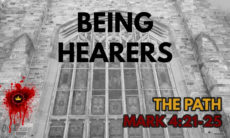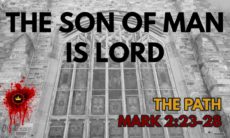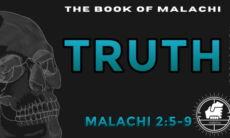Malachi: REFOCUSED
God’s Choice: Malachi 1:1-5
Pastor John Weathersby
Sunday September 26, 2021
55 verses four chapters, 1,781 words. With a low average reading speed of 200 words, 8.9 minutes of reading to read this book daily.
Twelve weeks 84 days, or potential for 747.6 minutes reading the word while we study this book.
Imagine how such a seemingly small investment of time, 8.9 minutes, will leave you transformed with the equivalent of almost 12 and a half hours of Bible reading time in a prophecy that calls to introspection, refocus, the character, and nature of God, and His coming Messiah, Jesus.
That’s it, that’s the challenge.
Now let us look at how this book opens up as we refocus on God’s love and Sovereignty:
Before we get going on Sovereignty, so that we speak about it from a common understanding, let’s talk about what it is.
Job 42:2 (ESV)
2 “I know that you can do all things,
and that no purpose of yours can be thwarted.
That’s it, God is all-powerful, and nothing can interfere with that. Not only is He all powerful He has right balanced with the power. Our statement of faith on firstreformed.org says that we are convinced by scripture and reason that God is […] sovereign, that He is immutable citing Malachi 3:6. Like the time tribal police in Arizona waved off a sheriff’s helicopter hovering over my vehicle and sent me on my way – right and authority. This is why it’s God’s Choice. With that in view:
Malachi 1:1 (ESV)
The oracle of the word of the Lord to Israel by Malachi.
Malachi 3:6 (ESV)
Robbing God
6 “For I the Lord do not change; therefore you, O children of Jacob, are not consumed.
Looking across ESV, NASB NIV, and NRSV, each uses the word phrases “oracle’ and “word of the Lord.” At the outset, we see not that this not the word of the prophet but specifically the word of the Lord to Israel through Malachi. In contrast, KJV and NKJV would talk about the “burden” of Malachi the oracle.
We see this oracle or “utterance/pronouncement” by the “word of the Lord.” “Word of the Lord” provides wording in Scripture as we see it is the “word of the Lord” specifically to Israel. The closest to this wording would be Zech 12:1’s “the Oracle of the Word of the Lord’ here it’s “to Israel by Malachi.” Like agency or power is given by God to bring this word/oracle/burden to Israel.
Zechariah 12:1 (ESV)
The Lord Will Give Salvation
1 The oracle of the word of the Lord concerning Israel: Thus declares the Lord, who stretched out the heavens and founded the earth and formed the spirit of man within him:
The first use of a messenger in Scripture to bring God’s word was
Exodus 9:35 (ESV)
35 So the heart of Pharaoh was hardened, and he did not let the people of Israel go, just as the Lord had spoken through Moses.
So this burden/oracle comes as the Word of the Lord, through the agency of God to Malachi to Israel here is post-exilic Israel. Books covering this pored ore Ezra, Nehemiah, Haggai, Zechariah, and Malachi (the last 3 (of which there are 12) being minor prophets). One of the aims of Ezra and Nehemiah was rebuilding. We see the scroll opened for the first time in a very long time, and the people cry:
Nehemiah 8:9 (ESV)
This Day Is Holy
9 And Nehemiah, who was the governor, and Ezra the priest and scribe, and the Levites who taught the people said to all the people, “This day is holy to the Lord your God; do not mourn or weep.” For all the people wept as they heard the words of the Law.
These post-exilic books aim to encourage God’s gathered people that though they’re a cobbled bunch, likely fragments of the previously well organized, dispersed tribes of Israel, they are God’s remnant. We see reminders in Mal, Ez, Neh, Zec calling the post-exilic Jews Israel. For us, they remind us of God’s intense faithfulness, his pursuit of us, and His Sovereignty.
The Lord’s Love for Israel
2 “I have loved you,” says the Lord. But you say, “How have you loved us?” “Is not Esau Jacob’s brother?” declares the Lord. “Yet I have loved Jacob
3 but Esau I have hated. I have laid waste his hill country and left his heritage to jackals of the desert.”
This gets interesting fast, but slow down on the first four words of verse 2. We see that the oracle/burden comes from God to Israel – through God’s agency too Malachi, and starts with “I have loved you.”
John Calvin points out that God could have come under several pretenses, including I’m God you should just listen to me or His general love for all creation. Still, he comes to them personally with a directed personal love He has for His people.
That is important to this whole book. Which finds a post-exile people who now struggle with faithfulness because of their lack of much, whereas pre-exilic people are forgetting God:
Hosea 13:4–6 (ESV)
4 But I am the Lord your God
from the land of Egypt;
you know no God but me,
and besides me, there is no savior.
5 It was I who knew you in the wilderness,
in the land of drought;
6 but when they had grazed, they became full,
they were filled, and their heart was lifted up;
therefore they forgot me.
They’d had much and forgotten God. Now they had little and need to refocus; what brings about that refocusing? God starts from His love for them.
Let’s look ahead to Paul’s dealing with this same root that brings about our lack of focus on God, contentment:
Philippians 4:9–13 (ESV)
9 What you have learned and received and heard and seen in me—practice these things, and the God of peace will be with you.
God’s Provision
10 I rejoiced in the Lord greatly that now at length you have revived your concern for me. You were indeed concerned for me, but you had no opportunity.
11 Not that I am speaking of being in need, for I have learned in whatever situation I am to be content.
12 I know how to be brought low, and I know how to abound. In any and every circumstance, I have learned the secret of facing plenty and hunger, abundance and need.
13 I can do all things through him who strengthens me.
Refocusing on God’s love for us will help us to be content.
Refocusing on God’s Sovereignty will help us to be content
2 “I have loved you,” says the Lord. But you say, “How have you loved us?” “Is not Esau Jacob’s brother?” declares the Lord. “Yet I have loved Jacob 3 but Esau I have hated. I have laid waste his hill country and left his heritage to jackals of the desert.”
He Loves them.
Ezekiel 25:12–14 (ESV)
Prophecy Against Edom
12 “Thus says the Lord God: Because Edom acted revengefully against the house of Judah and has grievously offended in taking vengeance on them,
13 therefore thus says the Lord God, I will stretch out my hand against Edom and cut off from it man and beast. And I will make it desolate; from Teman even to Dedan they shall fall by the sword.
14 And I will lay my vengeance upon Edom by the hand of my people Israel, and they shall do in Edom according to my anger and according to my wrath, and they shall know my vengeance, declares the Lord God.
The prophecy that Edom would be used to describe how God loved Jacob rather than Esau. God loved Jacob and not Esau before they were born (Genesis 25:23 and Romans 9:11-13) because not all Israel is elected:
Genesis 25:23 (ESV)
23 And the Lord said to her,
“Two nations are in your womb,
and two peoples from within you shall be divided;
the one shall be stronger than the other,
the older shall serve the younger.”
Romans 9:11-13 (ESV)
11 though they were not yet born and had done nothing either good or bad—in order that God’s purpose of election might continue, not because of works but because of him who calls—
12 she was told, “The older will serve the younger.”
13 As it is written, “Jacob I loved, but Esau I hated.”
Romans 9:6 (ESV)
6 But it is not as though the word of God has failed. For not all who are descended from Israel belong to Israel,
Jesus pulled on that thread first:
Luke 3:8 (ESV)
8 Bear fruits in keeping with repentance. And do not begin to say to yourselves, ‘We have Abraham as our father.’ For I tell you, God is able from these stones to raise up children for Abraham.
Matthew 3:9 (ESV)
9 And do not presume to say to yourselves, ‘We have Abraham as our father,’ for I tell you, God is able from these stones to raise up children for Abraham.
So the NT helps us understand the OT concept of Jacob and Esau (which we could spend months on). Esau was the father of the Edomites. He was the son of Issac and Rebekah, grandson of Abraham and Sarah. Same lineage, from birth, made himself older, later together stole his brother’s birthright but never could get ahead. God said in Genesis 25:23 that the older should serve the younger. We see God’s revelation to a pregnant Rebekah bare out:
Ezekiel 35:15 (ESV)
15 As you rejoiced over the inheritance of the house of Israel, because it was desolate, so I will deal with you; you shall be desolate, Mount Seir, and all Edom, all of it. Then they will know that I am the Lord.
If you would open to 2 Peter 1 and put your finger on verse 10:
God uses this relationship to contrast His special love and His Sovereignty for Israel in Malachi – and so that they would refocus on God over circumstances. He uses two brothers from the same line, reminding them that even of the line He chose to covenant with, he would be faithful to them, but they had responsibility as individuals to a relationship with Him. To drive our focus on Sovereignty, God not only chooses a line in Abraham, he chooses a brother (Jacob), but so that we’d not think this was simply nationalistic, we’re reminded that not all Israel is Israel –
Romans 9:16 (ESV)
16 So then it depends not on human will or exertion, but on God, who has mercy.
And so he calls us to refocus, through Malachi and in the NT understandings as nations of people now reached through Jesus’ finished work.
Individually they need repentance and following. That is their refocusing, refocus on God’s love and Sovereignty God’s Choice.
Now look down at your finger:
2 Peter 1:10 (ESV)
10 Therefore, brothers, be all the more diligent to confirm your calling and election, for if you practice these qualities, you will never fall.
We, too, should continually refocus. When we start with His love, then work out in His word through His Sovereignty, we’ll be content in Him.
No matter our circumstances.
Perhaps the Israelite would hear a warning to repentance and be lulled into inaction because of the covenant relationship to Abraham – God through His agent, Malachi, points to two bothers. Both could claim Abraham one by God’s Sovereignty was elect. To make the point further, God points to His satisfied prophecy that we read earlier from Ezekiel 25, which laid to permanent waste Edom, Esau’s land.
They ask “in what way have you loved us”. Perhaps if Haggai 1:7-11 exposes that the punishments were present because the people neglected the temple, and now the temple exists but they still suffer, the people question God’s word, faithfulness and as we see, His love. Malachi will be showing them that their violations of covenant (and lack of focus on God ultimately) cause their lack of comfort.
Haggai 1:7-11 (ESV)
7 “Thus says the Lord of hosts: Consider your ways.
8 Go up to the hills and bring wood and build the house, that I may take pleasure in it and that I may be glorified, says the Lord.
9 You looked for much, and behold, it came to little. And when you brought it home, I blew it away. Why? declares the Lord of hosts. Because of my house that lies in ruins, while each of you busies himself with his own house.
10 Therefore the heavens above you have withheld the dew, and the earth has withheld its produce.
11 And I have called for a drought on the land and the hills, on the grain, the new wine, the oil, on what the ground brings forth, on man and beast, and on all their labors.”
4 If Edom says, “We are shattered, but we will rebuild the ruins,” the Lord of hosts says, “They may build, but I will tear down, and they will be called ‘the wicked country,’ and ‘the people with whom the Lord is angry forever.’ “
5 Your own eyes shall see this, and you shall say, “Great is the Lord beyond the border of Israel!”
Great is the Lord beyond the border of Israel is pointing towards the future we see in 1:11 and 2:10, God’s shift in revelation to a national view, which extends His Grace and Mercy to all tribes, tongues, and nations in Christ.
Malachi 1:11 (ESV)
11 For from the rising of the sun to its setting my name will be great among the nations, and in every place incense will be offered to my name, and a pure offering. For my name will be great among the nations, says the Lord of hosts.
Malachi 2:10 (ESV)
Judah Profaned the Covenant
10 Have we not all one Father? Has not one God created us? Why then are we faithless to one another, profaning the covenant of our fathers?
So, we’re encouraged to refocus as NT Christians looking back on this powerful display of God’s Love and Sovereignty and election.
Spend time this week in 2 Peter and be encouraged that:
Romans 8:38-39 is true:
Romans 8:38–39 (ESV)
38 For I am sure that neither death nor life, nor angels nor rulers, nor things present nor things to come, nor powers,
39 nor height nor depth, nor anything else in all creation, will be able to separate us from the love of God in Christ Jesus our Lord.
As we focus here:
2 Peter 1:10 (ESV)
10 Therefore, brothers, be all the more diligent to confirm your calling and election, for if you practice these qualities, you will never fall.
Pray, Observe, Apply.


